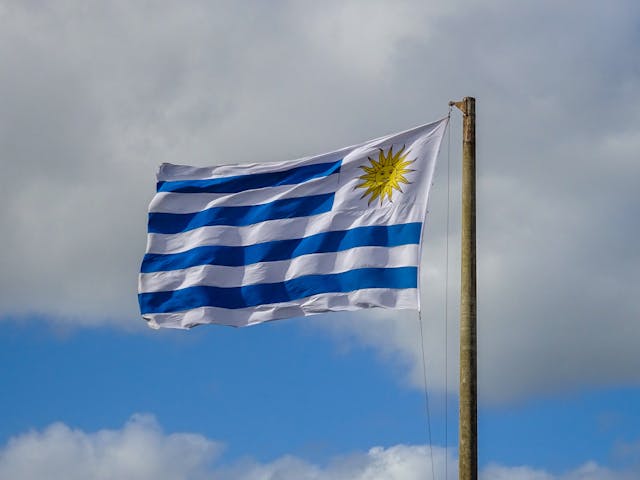
Uruguay, known for its stunning coastlines, rich culture, and high quality of life, is one such destination that offers a welcoming environment for digital nomads. In this comprehensive guide, we will detail the Uruguay Digital Nomad Visa, covering all aspects from requirements to the application process.
Introduction to the Uruguay Digital Nomad Visa
Uruguay, a gem in South America, has recognized the rising trend of digital nomadism and introduced a visa tailored specifically for remote workers. This visa allows individuals to live in Uruguay while continuing to work for companies outside the country, offering a perfect blend of work and leisure in a picturesque setting.
Uruguay introduced their Digital Nomad Visa, officially called the Provisional Identity Card (Hojas de Identidad Provisoria) in May 2023.
Benefits of the Uruguay Digital Nomad Visa
Choosing Uruguay as your digital nomad destination comes with numerous benefits:
- High Quality of Life: Uruguay boasts excellent healthcare, a stable political climate, and a high standard of living.
- Affordable Cost of Living: Compared to many Western countries, Uruguay offers a more affordable lifestyle without compromising on quality.
- Beautiful Scenery: From the bustling city of Montevideo to the serene beaches of Punta del Este, Uruguay offers diverse landscapes.
- Strong Internet Infrastructure: Reliable and fast internet services are available throughout the country, crucial for remote work.
- Welcoming Community: The locals are known for their hospitality, making it easy for newcomers to integrate.
Eligibility Requirements
To be eligible for the Uruguay Digital Nomad Visa, applicants must meet several criteria:
- Proof of Remote Employment: Applicants must demonstrate that they are employed by a company based outside of Uruguay or own a business that operates primarily outside the country.
- Minimum Income Requirement: At this time there is no salary requirement but this may change in the future. We however advise planning on earning between $1500 to $2000 per month This amount is considered sufficient to cover basic living expenses, including accommodation, food, transportation, and healthcare.
- Health Insurance: Proof of valid health insurance that covers medical expenses in Uruguay is mandatory.
- Clean Criminal Record: Applicants must provide a police clearance certificate from their home country, indicating no criminal history.
- Valid Passport: A passport with at least six months of validity remaining is required.
Minimum Income Requirements for the Uruguay Digital Nomad Visa
To ensure that digital nomads can support themselves while living in Uruguay, applicants must meet specific minimum income requirements. These requirements are designed to confirm that the applicant has a stable income source and can afford the cost of living in Uruguay without relying on local employment.
Minimum Income Threshold
At this time there is no salary requirement but this—and other requirements—may change in the future.
It is worth noting that in Uruguay the export of technology services is tax-exempt. A great advantage for digital nomads working in tech.
Meeting the suggested minimum income requirement is crucial for several reasons:
- Financial Stability: It assures the Uruguayan government that the applicant has the financial means to support themselves without burdening local resources.
- Smooth Application Process: Providing clear and sufficient proof of income can expedite the visa approval process.
- Sustainable Living: Ensuring a stable income allows digital nomads to enjoy a comfortable and sustainable lifestyle in Uruguay.
Documents Needed for Application
To apply for the Uruguay Digital Nomad Visa, the following documents are necessary:
- Completed Application Form: Available on the official immigration website.
- Proof of Employment: This could be an employment contract, a letter from your employer, or proof of business ownership.
- Bank Statements: Recent bank statements to demonstrate financial stability.
- Health Insurance Policy: Documentation of your health insurance coverage.
- Police Clearance Certificate: A certificate from your home country.
- Passport Photocopies: Copies of the relevant pages of your passport.
Step-by-Step Application Process
The application process for the Uruguay Digital Nomad Visa involves several steps:
1. Gather Required Documents
Before beginning the application process, ensure you have all the necessary documents. This preparation will streamline the process and reduce the likelihood of delays.
2. Complete the Application Form
Fill out the digital nomad visa application form available on the Uruguayan immigration website. Ensure all information is accurate and complete to avoid any issues.
3. Submit Your Application
Submit your completed application form along with the required documents either online or at the nearest Uruguayan consulate or embassy. Ensure you retain copies of all documents for your records.
4. Pay the Application Fee
There is an application fee that must be paid upon submission. The fee amount may vary, so check the latest information on the official website.
5. Attend an Interview
In some cases, applicants may be required to attend an interview. This interview can be conducted either in person at the consulate or embassy or via video call.
6. Wait for Approval
The processing time for the Uruguay Digital Nomad Visa can vary, but it generally takes a few weeks. During this time, your application will be reviewed, and additional information may be requested.
7. Receive Your Visa
Once your application is approved, you will receive your digital nomad visa, allowing you to reside in Uruguay for the specified duration.
Living in Uruguay as a Digital Nomad
Accommodation Options
Uruguay offers a range of accommodation options to suit various preferences and budgets. Here are some popular choices:
- Short-term Rentals: Websites like Airbnb and Booking.com offer numerous short-term rental options, from city apartments to beachfront properties.
- Long-term Rentals: For those planning to stay longer, consider long-term rentals. Websites like MercadoLibre and local real estate agents can assist in finding suitable housing.
- Co-living Spaces: Co-living spaces provide a community atmosphere and often come with amenities tailored for remote workers, such as high-speed internet and communal workspaces.
Cost of Living
The cost of living in Uruguay can vary depending on lifestyle and location. On average:
- Housing: Monthly rent for a one-bedroom apartment in Montevideo ranges from $400 to $800, while outside the capital, prices can be lower.
- Groceries: A month’s worth of groceries for one person typically costs around $200 to $300.
- Dining Out: A meal at an inexpensive restaurant costs about $10, while a three-course meal at a mid-range restaurant can cost around $30.
- Transportation: Public transportation is affordable, with bus fares in Montevideo costing approximately $1 per trip. Taxis and ride-sharing services are also available.
Healthcare and Insurance
Uruguay has a high standard of healthcare, with both public and private options available. As a digital nomad, having comprehensive health insurance is crucial. Many international health insurance providers offer plans that cover medical expenses in Uruguay.
Internet and Workspaces
Reliable internet is essential for digital nomads. Uruguay has widespread internet coverage with various service providers offering high-speed connections. Additionally, there are numerous coworking spaces in cities like Montevideo and Punta del Este, providing professional environments for remote work.
Exploring Uruguay
Uruguay offers a wealth of experiences for digital nomads. From cultural attractions to natural wonders, here are some must-visit places:
Montevideo
The capital city is a vibrant hub of culture and commerce. Highlights include:
- Ciudad Vieja: The historic old town with colonial architecture, museums, and markets.
- Rambla: A scenic waterfront promenade perfect for jogging, cycling, or leisurely walks.
- Mercado del Puerto: A bustling market offering delicious local cuisine and artisan crafts.
Punta del Este
A popular beach destination known for its upscale resorts and lively nightlife. Key attractions include:
- Playa Brava: Famous for its strong surf and the iconic “Hand in the Sand” sculpture.
- Casapueblo: An art gallery and museum built by artist Carlos Páez Vilaró, offering stunning views of the coastline.
- La Barra: A trendy area with chic boutiques, restaurants, and bars.
Colonia del Sacramento
A UNESCO World Heritage Site, Colonia del Sacramento is renowned for its well-preserved colonial architecture. Visitors can enjoy:
- Historic Quarter: Cobblestone streets and charming buildings that transport you back in time.
- Faro de Colonia: A lighthouse offering panoramic views of the town and the Rio de la Plata.
- Museo Portugués: A museum showcasing the history of the Portuguese settlers.
Networking and Community
Joining local communities and networking with fellow digital nomads can enhance your experience in Uruguay. Consider these tips:
- Coworking Spaces: These hubs often host events and meetups, providing opportunities to connect with other remote workers.
- Expats in Uruguay: Online forums and social media groups for expats can be a great resource for meeting people and getting advice.
- Local Events: Participate in local events, festivals, and social gatherings to immerse yourself in the culture and make new friends.
- Sports and Clubs: Join local clubs or sports teams to stay active and meet like-minded individuals.
Digital Nomad Hotspots in Uruguay
Several areas in Uruguay are particularly popular among digital nomads due to their vibrant communities and amenities:
1. Montevideo
As the capital city, Montevideo offers everything a digital nomad needs, from coworking spaces to cultural activities. Areas like Pocitos and Carrasco are especially favored for their safety, amenities, and social scenes.
2. Punta del Este
Known as the St. Tropez of South America, Punta del Este is ideal for those who enjoy a beach lifestyle combined with modern amenities. While it’s more seasonal, the off-peak periods still offer a pleasant environment with fewer crowds.
3. Colonia del Sacramento
For a quieter, historical setting, Colonia del Sacramento is perfect. Its charm lies in its well-preserved colonial architecture and relaxed pace of life, ideal for those seeking inspiration away from the hustle and bustle.
Cultural Insights and Etiquette
Understanding local customs and etiquette will enhance your stay in Uruguay:
- Greetings: A handshake or a cheek kiss is common when meeting someone.
- Punctuality: Uruguayans are relatively relaxed about time, but it’s still polite to be punctual for business meetings.
- Socializing: Meals are social events. Don’t rush through them; take time to enjoy the conversation.
- Attire: Dress is casual but neat. For business meetings, opt for smart casual attire.
Sustainability and Environmental Consciousness
Uruguay is known for its commitment to sustainability and environmental protection. As a digital nomad, you can contribute by:
- Using Public Transport: Reduce your carbon footprint by using the efficient public transport system.
- Supporting Local Businesses: Choose local products and services to support the economy and reduce the environmental impact of imported goods.
- Recycling: Participate in recycling programs available in many cities.
The Uruguay Digital Nomad Visa offers a unique opportunity for remote workers to experience the charm and beauty of Uruguay while maintaining their professional pursuits. With its favorable living conditions, rich culture, and welcoming environment, Uruguay stands out as an ideal destination for digital nomads. By following the outlined requirements and application process, you can embark on an exciting journey, blending work and leisure in one of South America’s most captivating countries.
Whether you’re drawn to the vibrant city life of Montevideo, the luxurious beaches of Punta del Este, or the historic charm of Colonia del Sacramento, Uruguay has something for every digital nomad. Embrace the opportunity, immerse yourself in the local culture, and enjoy the many benefits that come with living and working in this beautiful country.
If you are not interested in moving to Uruguay, have a look at our list of Best Countries for Digital Nomads.


